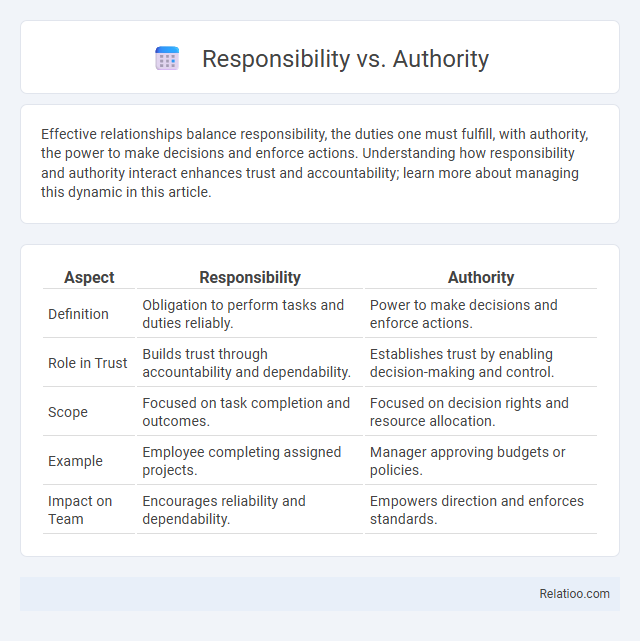Effective relationships balance responsibility, the duties one must fulfill, with authority, the power to make decisions and enforce actions. Understanding how responsibility and authority interact enhances trust and accountability; learn more about managing this dynamic in this article.
Table of Comparison
| Aspect | Responsibility | Authority |
|---|---|---|
| Definition | Obligation to perform tasks and duties reliably. | Power to make decisions and enforce actions. |
| Role in Trust | Builds trust through accountability and dependability. | Establishes trust by enabling decision-making and control. |
| Scope | Focused on task completion and outcomes. | Focused on decision rights and resource allocation. |
| Example | Employee completing assigned projects. | Manager approving budgets or policies. |
| Impact on Team | Encourages reliability and dependability. | Empowers direction and enforces standards. |
Understanding Responsibility vs Authority
Understanding the distinction between responsibility and authority is crucial for effective leadership and management. Responsibility refers to the obligation to complete tasks and achieve goals, while authority is the power or right to make decisions and allocate resources to fulfill those tasks. Your ability to balance responsibility with corresponding authority determines the efficiency and accountability within your team or organization.
Defining Responsibility in Organizations
Responsibility in organizations refers to the obligation to complete assigned tasks and achieve specific outcomes, ensuring accountability for results. Authority grants the power to make decisions and allocate resources necessary to fulfill responsibilities effectively. Understanding the balance between your responsibility and authority is crucial for successful organizational performance and clear role definition.
What Is Authority? Key Characteristics
Authority represents the formal power granted to an individual or position to make decisions, allocate resources, and enforce rules within an organization. Key characteristics include legitimacy, the ability to command compliance, and accountability for outcomes. Your clear understanding of authority helps ensure effective delegation and organizational control.
The Relationship Between Responsibility and Authority
The relationship between responsibility and authority is fundamental in organizational management, where authority grants the power to make decisions and allocate resources, while responsibility entails the obligation to complete assigned tasks. Effective delegation requires aligning authority with corresponding responsibility to ensure accountability and prevent bottlenecks in decision-making processes. When authority and responsibility are balanced, employees can perform their duties confidently, fostering efficiency and organizational success.
Delegation: Balancing Responsibility and Authority
Delegation requires a careful balance between responsibility and authority to ensure tasks are completed efficiently without overstepping boundaries. You must grant sufficient authority to empower your team while maintaining ultimate responsibility for outcomes. Clear communication of delegated authority helps prevent confusion and fosters accountability in achieving shared goals.
Common Conflicts Between Responsibility and Authority
Conflicts between responsibility and authority often arise when Your duties exceed the power granted to make decisions, resulting in frustration and inefficiency. Employees tasked with accountability may lack the authority to execute necessary actions, creating bottlenecks and delays in project completion. Clear alignment between responsibilities and decision-making authority is essential to avoid misunderstandings and ensure smooth organizational operations.
Leadership Styles: Impact on Responsibility and Authority
Leadership styles significantly influence the balance between responsibility and authority within a team. Transformational leaders often delegate authority, empowering employees to take responsibility for their tasks, which enhances motivation and accountability. In contrast, autocratic leaders retain authority, limiting subordinate responsibility and potentially reducing initiative and innovation.
Enhancing Accountability Through Clear Authority
Clear authority defines the scope of decision-making power, enabling You to fulfill your responsibilities effectively. Establishing precise authority channels enhances accountability by ensuring that those responsible have the necessary control to execute tasks and achieve outcomes. When responsibility aligns with clear authority, organizations reduce ambiguity, improve performance, and foster trust in leadership.
Case Studies: Responsibility vs Authority in Action
Case studies of Responsibility vs Authority in action reveal how clear role definitions impact organizational efficiency and accountability. For example, in a multinational corporation, a project manager held responsibility for deliverables but lacked the authority to allocate resources, causing delays and frustration. This gap between responsibility and authority highlights the necessity of aligning decision-making power with assigned duties to optimize performance and outcomes.
Best Practices for Aligning Responsibility with Authority
Aligning responsibility with authority is crucial for effective decision-making and accountability within any organization. Clear delegation ensures Your team members have the necessary authority to fulfill their assigned responsibilities, preventing bottlenecks and enhancing operational efficiency. Establishing transparent communication channels and regularly reviewing roles helps maintain alignment and empowers employees to take ownership of their tasks confidently.

Infographic: Responsibility vs Authority
 relatioo.com
relatioo.com